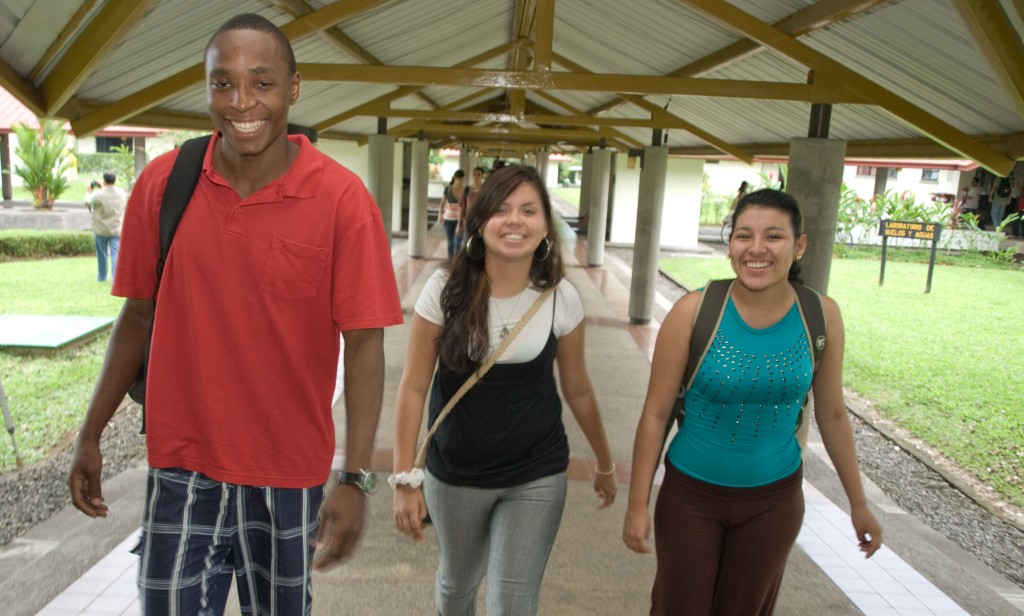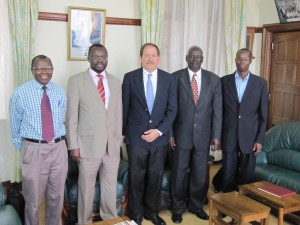EARTH grows through its involvement in Africa
Twelve years ago EARTH University was a very different institution. Before the year 2000, EARTH’s student population had been entirely recruited from Latin America and the Caribbean. With the exception of a few Brazilians and Belizeans, Spanish was the native language for most students.
Fast forward to January 2012. When the new class year starts early next year, EARTH will have more than 40 students from African countries. Including students from Haiti and Jamaica, Spanish will be a second or third language for more than 60 students.
“We are becoming a more intercultural institution,” reflects Dr. Daniel Sherrard, EARTH University provost. “Granted this requires a lot of learning and adaptation, but it’s an enriching process that will make our students and our staff better professionals and global citizens.”

EARTH’s involvement in the development processes in Africa has evolved organically in the past 10 years following the Sustainability, Education and the Management of Change in the Tropics (SEMCIT) international seminars co-organized by EARTH University, the Norwegian Government and the Salzburg Seminar from 1999-2003. The Norwegian Government, which had already been supporting EARTH for several years with scholarships, asked EARTH leadership if they would consider having an African at the school during the SEMCIT seminar program.
“There was a lot of support for EARTH’s approach and a feeling in the Norwegian Ministry of Foreign Affairs that what EARTH was doing was relevant to Africa,” explains Olav Kjorven, Assistant Secretary-General of the United Nations Development Programme, who at the time of SEMCIT was the State Secretary for International Development for the Norwegian Government.
EARTH enthusiastically agreed and in January 2000 welcomed its first African students, Francis Nimukunda and Sylvia Natukunda, both from Uganda.
“EARTH in many ways was still in its infancy. Having African students was something new for us and for Costa Rica. I still remember the article in La Nación newspaper featuring Francis and Sylvia. We started to get a lot of attention,” recalls Wendy Judy, former coordinator of the SEMCIT secretariat at EARTH and current Director of Foundations for the EARTH University Foundation.
In the SEMCIT seminars, EARTH started developing strong relationships with African colleagues, for many different reasons cites Judy, “there are similar challenges and there was a lot of chemistry and interest on both sides.”
After the series, EARTH continued working with The Regional Universities Forum for Capacity Building in Agriculture (RUFORUM), a consortium of 29 universities in Eastern, Central and Southern Africa. Provost Sherrard has participated in several RUFORUM meetings in recent years. One result of this collaboration is the development of a project in which EARTH will provide three RUFORUM universities with assistance in strengthening their capacity in experiential based education and community engagement. The project includes EARTH faculty traveling to Kenya, Malawi and Uganda to provide training and African faculty and students coming to EARTH.
EARTH chemistry professor, Dr. Manuel Cerrato, who has conducted such workshops at Mekelle University in Ethiopia and Makerere University in Uganda and has since visited other African countries for recruiting, believes that his time in Africa has been a broadening experience. He also sees the increase in the number of African students as a competitive advantage for EARTH.
“I can see in my students and colleagues how this increasing cultural diversity is having a profound impact on their world view,” mentions Manuel.
Sherrard agrees, “Africa has tremendous potential and resources, and it’s a great opportunity for our students to form ties across continents and regions.”

The increase in the number of African students at EARTH has been thanks to funding partners who have been interested in promoting south-south partnerships, and believe that EARTH’s approach can prepare the leaders required to foster lasting and positive change in Africa and elsewhere. The initial support provided by the Norwegian Government paved the way for more recent partnerships with the Leventis Foundation, the Open Society Foundations and The Master Card Foundation to bring African students to EARTH.
As for the relevance of the education that the more than 50 current students and alumni from Africa receive at EARTH, Gloria Egberayenu Yafugborhi, a first year student from Nigeria comments, “EARTH offers what no other school offers in agronomy. We get practical experience and courses in waste management, engineering, bio-digesters, entrepreneurship, computers and cultivation—if someone wants to be self-sufficient, if you don’t want to work for somebody, what you learn here is enough to start your own business.”
And in a country where college graduates out-number available jobs, learning how to create your own opportunities says Gloria is an education for the future.




